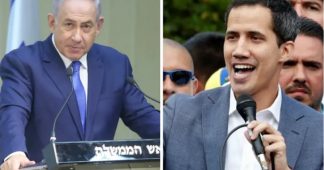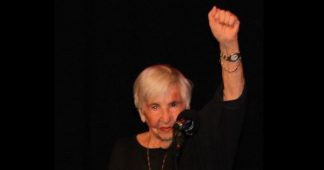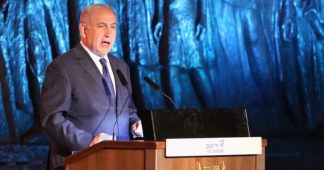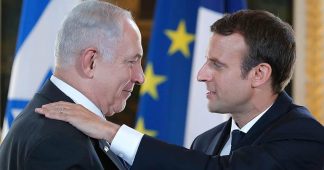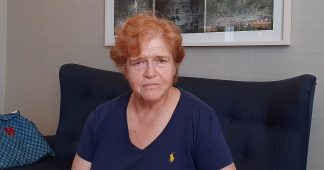By
27 Jan. 2020
Monday is the 75th anniversary of the Soviet army’s liberation of Auschwitz, the death camp in Poland built by the German government during World War II.
The Nazis murdered more than one million people in Auschwitz, the vast majority European Jews.
The anniversary of the camp’s liberation is marked as International Holocaust Remembrance Day.
These are crimes that must be remembered, to honor the victims of the European genocide and so that universal lessons can be learned and applied to the present day for the benefit of all humanity.
Sadly, however, Israel and its supporters seek to co-opt this memory for their own purposes.
Israel has “used the history of the oppression of Jews in Europe often historically and as it does today to justify many of its crimes,” Columbia University professor Joseph Massad told RT’s Going Underground program on Monday.
Last week, Israel hosted dozens of world leaders for its own gathering to commemorate the Auschwitz anniversary.
Massad pointed to how Israeli Prime Minister Benjamin Netanyahu used that gathering as an occasion to attack the International Criminal Court, which is currently investigating Israeli war crimes against Palestinians.
He also noted Israel’s effort to impose a controversial definition of anti-Semitism that equates criticism of Israel and its racist state ideology Zionism, on the one hand, with bigotry against Jews, on the other.
Watch the interview with Massad above.
“Never again”
Writing in Haaretz last week, journalist Gideon Levy was scathing about the event hosted by Israel.
“To be the guests of Israel without mentioning its crimes; to commemorate the Holocaust while ignoring its lessons; to visit Jerusalem without traveling to the Gaza ghetto on International Holocaust Remembrance Day – one can barely think of any greater hypocrisy,” Levy writes.
“When today they recite ad nauseam ‘never again,’ one should cast one’s eyes honestly to the south and east, only a few kilometers away from the memorial hall at Yad Vashem,” Levy says, referring to Gaza as a “concentration camp.”
“There’s no holocaust there, only apartheid. No annihilation, but a systematic brutalization of a nation. Not Auschwitz, but Gaza. How can one ignore this on International Holocaust Remembrance Day?”
The answer is that one can’t and one must not.
In recent years, The Electronic Intifada has published interviews with Holocaust survivors who insist precisely that we draw universal lessons from the atrocities they witnessed.
Surviving Auschwitz
Esther Bejarano, now in her nineties, was sent to Auschwitz as a girl. There she played in the women’s orchestra – as long as the camp commanders were happy, she and her fellow musicians avoided being murdered.
She is still a performing musician today.
Her parents Rudolf and Margarethe Loewy did not survive. They were murdered by the Nazis in Lithuania in 1941.
After the war, Bejarano emigrated to Palestine, but eventually returned to her native Germany, disgusted at how Palestinians were being treated.
She says that even she – an Auschwitz survivor – has been labeled an anti-Semite for speaking out for Palestinian rights. Yet she is not deterred.
Refusing to be silent, she told The Electronic Intifada in 2018 that Israel’s government is “fascist” and that she supports BDS – boycott, divestment and sanctions – if it helps challenge Israel’s persecution of Palestinians.
Jacques Bude, a retired professor from Belgium, survived the Nazi genocide because he was saved by farmers who hid him as a child. His parents were deported and murdered in Auschwitz. After the war, he was sent to Palestine against his will as a Zionist settler.
“I really felt in exile,” Bude told The Electronic Intifada in 2017. “I was destroyed by German militarism and I came to Israel and again encountered militarism.”
He returned home to Belgium.
The Nazi ideology “led to the genocide of the Jews, the Roma, the Sinti, homosexuals and the mentally disabled,” Bude said. “It is the worst dehumanization that happened until today. It was industrial and they went all the way. They dehumanized them completely, to a pile of hair and gold.”
“So the duty of memory is to say never more dehumanization,” Bude added. “If we say ‘never again,’ we have to decide where we stand and condemn it.”
And that includes condemning Israel’s crimes: “I am against ethnic cleansing of Palestinians, which is a form of dehumanization.”
Hajo Meyer was deported to Auschwitz in 1944.
After surviving the war, he returned to the Netherlands where he had a long career as a physicist. He was also a fierce anti-Zionist and staunch supporter of Palestinian rights.
That made him a target of relentless smears from Israel’s supporters, even after his death in 2014.
But he too was never silenced by such attacks.
In his last interview, which was with The Electronic Intifada, Meyer urged Palestinians “not to give up their fight,” even if that meant armed struggle.
The lesson Israel wants us to take from the Holocaust is that it has the right to do whatever it wants to Palestinians with impunity in the name of protecting Jews.
But the right lesson to take – and it is more urgent than ever – is that all of us must stand together against racial and religious hatred and oppression, no matter who its victims are.
Published at https://electronicintifada.net/blogs/ali-abunimah/how-israel-exploits-holocaust-remembrance-day
